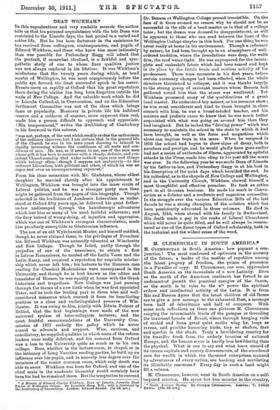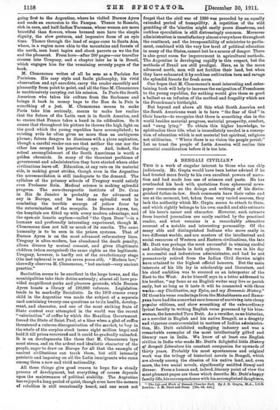M. CLEMENCEAU IN SOUTH AMERICA" M. CLEMENCEAII in South America:
bow piquant a con- junction ! The most confirmed of optimists in the nursery of the future, a leader of the mother of republics among the latest progeny of freedom, the prince of pressmen in a Paradise of copy. M. Clemeneeau, one sees, approaches South America as the incunabula of a new Latinity. Even as the north of the American continent has forced to an undreamt-of growth the practical energies of the Saxon, so the south is to raise to the nth power the spiritual ardour and intellectual activity of the Latin. It is from Rio and Buenos Ayres that the latest children of old Rome are to give a new message to the exhausted East, a message born half of inheritance and half of conquest. With some such reflections as these one pictures M. Clemencean ranging the interminable levels of the pampas or threading the luxuriant forests of Brazil, where through hanging veils of orchid and liana great quiet moths wing by, huge as ravens, and gemlike bumming birds, tiny as chafers, dart and sparkle in the shade. Truly a bewildering country for the traveller fresh from the orderly beauties of cultured Europe, and the human scene is hardly less bewildering than the physical. What is one to say and what leave unsaid of its rococo capitals and uneasy Governments, of the unordered race for wealth in which ten thousand enterprises, manned by adventurers of every nation, are hacking and mutilating its illimitable resources ? Every day in such a land might fill a volume.
M. Clemenceau, however, went to South America on a self- imposed mission. He spent but two months in the country, • South America To-day. By Georges C/emenoean. London: T. Fishes Unwiu. [12s. ed. net..]
going first to the Argentine, where he visited Buenos Ayres and made an excursion to the Pampas. Thence to Rosario, rich in corn, and half-Indian Tucuman, whose women are more beautiful than flowers, whose bronzed men have the simple dignity, the slow gestures, and impassive faces of an epic time. Thence through the land of sugar-cane to Santa Ana, where, in a region more akin to the mountains and forests of the north, men hunt tapirs and shoot parrots as we the fox and the pheasant. From here—after 200 pages—our traveller crosses into Uruguay, and a chapter later he is in Brazil, which engages him for the remaining seventy pages of the book.
M. Clemencean -writes of all he sees as a Parisian for Parisians. His easy style and facile philosophy, his vivid observation and apt anecdote, carry the reader smoothly and pleasantly from point to point, and all the time M. Clemenceau is unobtrusively carrying out his mission. In Paris the South American who takes his culture from the Sorbonne and brings it back in money bags to the Rue de la Pain is something of a jest. M. Clemenceau means to make Paris take him seriously, means to make her realize that the future of the Latin race is in South America, and to ensure that France takes a hand in its edification. So it comes that throughout his picture he throws the high light on the good which the young republics have accomplished ; to existing evils he often gives no more than an ambiguous phrase; future dangers he dismisses with a pious aspiration, though a careful reader can see that neither the one nor the other has escaped his penetrating eye. And, indeed, the actual accomplishment of the South Americans is worth a golden chronicle. In many of the thorniest problems of government and administration they have started where older civilizations leave off. Education, at any rate on its material side, is making great strides, though even in the Argentine the accommodation is still inadequate to the demand. The syllabus of the primary schools of Uruguay would satisfy even Professor Rein. Medical science is making splendid progress. The sero-therapeutic institute of Dr. Cruz in Rio de Janeiro is probably as far advanced as any in Europe, and he has done splendid work in combating the terrible scourge of yellow fever by the extermination of the mosquito. In Buenos .Ayres, too, the hospitals are fitted up with every modern advantage, and the open-air lunatic asylum—called " the Open Door "—is a humane and profoundly interesting experiment, though M. Clemencean does not tell us much of its results. The same humanity is to be seen in the prison systems. That of Buenos Ayres is on the most advanced reformatory lines. Uruguay is ultra-modern, has abandoned the death penalty, allows divorce by mutual consent, and gives illegitimate children (when recognized) the same rights as the legitimate. Uruguay, however, is hardly out of the revolutionary stage (the last upheaval is not yet seven years old). " Modern law," shrewdly observes M. Clemenceau, " but ancient—very ancient practice."
Sanitation seems to be excellent in the large towns, and the municipalities take their duties seriously ; almost all have pro- vided magnificent parks and pleasure grounds, while Buenos Ayres boasts a library of 190,009 volumes. Legislation tends to be markedly Socialistic. In the 1909 census every child in the Argentine was made the subject of a separate card containing twenty-one questions as to its health, develop. ment, and character, and one of the most striking feats of State control ever attempted in the world was the recent " valorization" of coffee by which the Brazilian Government forced the State of Saint Paul, at a time when a glut of coffee, threatened a ruinous disorganization of-the market, to buy in the whole of the surplus stock (some eight million bags) and hold it till prices recovered and it could be gradually unloaded. It is on developments like these that M. Clemencean lays most stress, and on the ardent and idealistic character of the people, eager to draw on Europe for all that the example of ancient civilizations can teach them, but still intensely patriotic and imposing on all the Latin immigrants who come among them a new and vivid nationality.
All these things give good reason to hope for a steady process of development, but everything of course depends upon the maintenance of political stability. The Argentine has enjoyed a long period of quiet, though even here the menace of rebellion is still occasionally heard, and one must not forget that the civil war of 1890 was preceded by an equally extended period of tranquillity. A repetition of the wild gambling of the 'nineties might easily prove disastrous, and reckless speculation is still distressingly common. Moreover administration is unsatisfactory almost everywhere throughout the continent, and the irresponsibility of ministries to parlia- ment, combined with the very low level of political education in many of the States, cannot but be a source of danger. There is also great room for improvement in agricultural methods. The Argentine is developing rapidly in this respect, but the methods of Brazil are still prodigal. Here, as in the more advanced north, men will not fertilize their land, but when they have exhausted it by reckless cultivation turn and ravage the splendid forests for fresh acres.
One hopes that M. Clemenceau's most interesting and enter- taining book will help to increase the emigration of Frenchmen to the young republics, for nothing would give them so good a ballast as an infusion of the method and frugality which are the Frenchman's birthright.
But beyond and above all this what South America and the South Americans want is to have " the fear of God" in their hearts—to recognize that there is something else in the world besides material progress, material prosperity, comfort, and "snug lying." To obtain this higher knowledge, to spiritualize their life, what is immediately needed is a concep- tion of education which is not material but spiritual, religious not utilitarian. " Where there is no vision the people perish." Let us trust the people of Latin America will realize this essential consideration before it is too late.







































 Previous page
Previous page